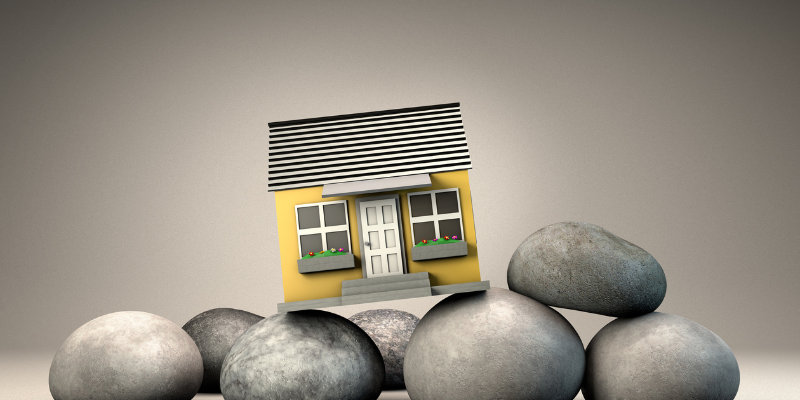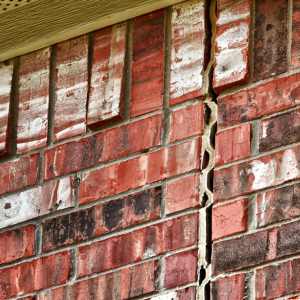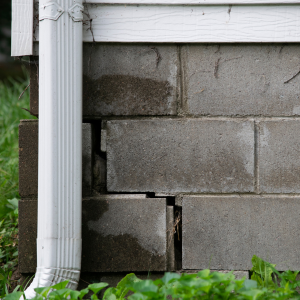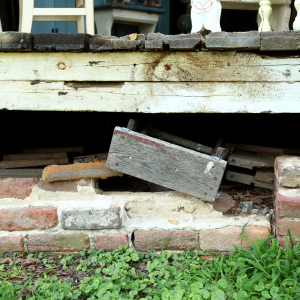
Understanding Foundation Problems in Virginia Real Estate
It is imperative for homeowners who are considering selling their property to comprehend the issues associated with foundations in Virginia real estate. The region’s diverse soil types, including clay-rich soils that expand and contract in response to precipitation fluctuations, can result in foundation issues that cause structural instability.
These problems often manifest as cracks in walls, uneven floors, or doors that fail to close correctly. In Virginia’s humid climate, excessive moisture can exacerbate these issues by weakening the soil supporting the foundation.
Sellers need to know these signs before they sell their house so they can deal with them correctly. Homeowners can find out how bad the damage is and whether they need reinforcements or repairs by getting a professional evaluation and report from a licensed structural engineer.
Understanding local building codes and disclosure requirements is also essential when selling a home with foundation problems in Virginia, ensuring legal compliance and transparency with potential buyers. Addressing these challenges head-on helps maintain property value and builds trust with prospective purchasers who may be wary of underlying structural defects.
Common Causes of Foundation Issues in Virginia Homes
Foundation issues in Virginia homes can arise from various common causes, often linked to the region’s climate and soil conditions. One prevalent factor is the expansive clay soil found throughout much of Virginia, which tends to swell when wet and contract when dry, leading to significant shifts that can damage a home’s foundation.

Frequent rains increase moisture near foundations, exacerbating these problems. Clogged gutters or inadequate drainage can cause water to accumulate near a home’s foundation, placing hydrostatic pressure on the walls.
Tree roots seeking moisture can invade and disrupt foundational structures, especially if trees are planted too close to the house. Construction practices also play a critical role; older homes may have been built with inadequate materials or techniques that do not withstand environmental stresses as effectively.
Furthermore, natural disasters such as earthquakes or strong winds can cause abrupt shifts in the ground beneath a property, resulting in fissures or settling concerns. Understanding these typical reasons is critical for homeowners who want to handle and mitigate foundation issues in their Virginia residences successfully.
Identifying Signs of Foundation Damage Before Selling
Before putting a Virginia home with foundation problems on the market, it’s crucial to identify signs of foundation damage to ensure a smoother selling process. Homeowners should be vigilant for indicators such as cracks in the walls, especially around windows and doors, which often suggest shifting or settling foundations.
Uneven floors can also be a red flag, signaling potential structural issues beneath the surface. If doors or windows are sticking or not closing properly, it might indicate that the foundation is no longer level.
Furthermore, spaces between walls, ceilings, or floors may indicate substantial settlement issues. Inspecting the property’s perimeter for moisture accumulation and drainage issues is imperative, as water damage in cellars or crawl spaces may exacerbate foundation issues.
If sellers notice these signs early, they can fix them before they become problems, which makes the house more appealing to buyers, even though it has fundamental issues.
The Impact of Foundation Problems on Property Value
Foundation issues can dramatically reduce the value of a Virginia home, resulting in poorer marketability and selling prices. Buyers are apprehensive of properties with structural faults, fearing expensive repairs or future damage.
If a house has foundation difficulties, it can get fewer offers, and potential buyers might pay much less than the asking price because they think it’s risky. When appraisers look at a property’s value, they also look at problems with the foundation. This generally lowers the home’s value compared to similar homes in better shape.
Sellers may occasionally need to spend money on expert inspections or repairs to reassure purchasers and maintain the property’s standing on the market. During inspections, even minor foundation problems might cause concerns that lead to negotiations that usually work in the buyer’s favor.
Consequently, comprehending the influence of these structural issues on property value is essential for sellers aiming to maneuver the real estate market proficiently.
Legal Considerations for Selling a House with Structural Defects
When selling a Virginia property with foundation issues, it is essential to address the legal implications meticulously. Vendors must reveal any known structural deficiencies, including foundation problems, to prospective purchasers.
This disclosure must be included in the Virginia Residential Property Disclosure Statement. Failure to provide this information may result in legal or financial repercussions for the vendor.
It’s advisable to obtain a professional inspection report as evidence of transparency and due diligence. Additionally, sellers should consider whether selling “as-is” might limit their liability, though this may affect the property’s marketability and sale price.
Engaging a real estate attorney can guarantee adherence to Virginia’s legal stipulations and assist sellers in comprehending their rights and responsibilities concerning properties with substantial structural faults, such as foundation issues.
How to Disclose Foundation Issues to Potential Buyers
When selling a Virginia home with foundation issues, disclosing these issues transparently to potential purchasers is imperative. Begin by obtaining a comprehensive inspection from a certified structural engineer or home inspector to accurately evaluate the extent of the foundation damage.
Giving prospective purchasers thorough documentation and expert evaluations shows integrity and fosters trust. Provide documentation of the work done and any actions already taken to remedy the foundation problems, such as reinforcements or repairs.
Be upfront about how these problems have impacted the property’s value and your willingness to negotiate on price accordingly. Highlighting transferable warranties or guarantees related to foundation repairs can also reassure prospective buyers.
By proactively disclosing all relevant information regarding foundation problems, sellers can foster a smoother transaction process and maintain transparency throughout negotiations, something that’s especially valued when we buy houses in Amissville and other cities in Virginia.
Repair Options for Foundation Problems: Costs and Benefits
Knowing the repair alternatives might significantly affect your approach when selling a Virginia property with foundation issues. Foundation repair expenses range from crack injections to pier installation or foundation replacement, depending on the severity and solution.
Crack injections are cheaper, usually costing a few hundred dollars, and they work for small cracks that don’t affect the strength of the structure. Installing piers like steel or helical can help keep things stable for a long time if the damage worsens, but they can cost thousands of dollars.
While these solutions require a larger investment upfront, they can enhance the home’s marketability by reassuring potential buyers about structural safety. Additionally, addressing foundation issues before listing the property can prevent costly negotiations during the sale process and potentially increase the home’s value.
Comprehending these repair alternatives enables sellers to evaluate their expenses relative to their advantages, ensuring a judicious decision corresponding to financial factors and market anticipations.
Hiring a Structural Engineer for a Home Assessment in Virginia
If you want to sell a house in Virginia with foundation problems, you must hire a structural engineer to evaluate the property thoroughly. A trained structural engineer checks the foundation’s stability and finds any problems hindering the sale.
This professional inspection helps understand the severity of the foundation problems and offers insights into necessary repairs and potential costs, giving both sellers and buyers confidence in the property’s condition. Additionally, a detailed report from a reputable structural engineer can facilitate transparency during negotiations and enhance buyer trust by demonstrating proactive measures to address deficiencies.
In Virginia’s real estate market, where disclosure laws are stringent, such an assessment can ensure compliance and reduce seller liability risks. Utilizing a local structural engineer well-versed in Virginia’s distinctive soil conditions and construction codes further guarantees that all evaluations are pertinent and precise, facilitating a more efficient transaction process.
Negotiating Home Sale Price with Known Structural Issues
When negotiating the sale price of a Virginia home with foundation problems, it’s crucial to be transparent about the structural issues while strategically positioning your property in the market. Start by obtaining a professional evaluation from a licensed structural engineer who can provide a detailed report on the extent of the foundation problems.
This documentation fosters trust with prospective purchasers and establishes reasonable expectations concerning required repairs and related expenses. Providing repair estimates with this report might enable buyers to make educated judgments and enhance price discussions.
Consider pricing your home competitively by factoring in these repair costs and local market conditions. This will make it more attractive to buyers willing to undertake renovations. Being open to providing repair credits or concessions at closing can further incentivize prospective buyers who may be hesitant due to the structural issues.
You can also speed up the selling process by going after cash buyers or investors specializing in fixer-upper houses. These buyers are usually more used to buying homes with significant problems. These strategies will help you get through talks and make a sale, even if the foundation has known problems.
Marketing Strategies for Selling a House with Foundation Damage
When marketing a house with foundation problems in Virginia, it’s crucial to employ effective strategies highlighting the property’s potential while addressing buyers’ concerns. Start by being transparent about the foundation issues; buyers appreciate honesty, and it builds trust.
Have a professional look at the damage and write a thorough report with information on how much it might cost to fix. This report can then be shared with people interested in buying the house. You could price the home competitively to reflect the repairs that need to be done. This would make it a good investment for people ready to do the work.
Emphasize positive aspects such as location, square footage, and unique features that set the property apart from others in the market. Highlight any completed repairs or improvements unrelated to the foundation to show ongoing maintenance efforts.
Use high-quality images in your listings that show places unaffected by foundation problems. You might also think about virtual tours to reach more people. Work with real estate brokers who have sold properties with structural problems before. They may provide helpful tips on negotiating deals and identifying purchasers who can see the potential beyond the current issues.
Working with Real Estate Professionals Experienced in Problematic Sales
Working with real estate professionals with challenging sales experience can be beneficial when trying to sell a house in Virginia with foundation issues. These specialized professionals know how to sell homes with structural problems.

They understand how to effectively explain the level of foundation damage to prospective purchasers while emphasizing the property’s potential and distinguishing qualities. An experienced home buyer will have a network of reputable contractors and inspectors who can provide realistic assessments and repair estimates, boosting buyer confidence.
They also know how to price these kinds of homes fairly so that the listing looks good but is still reasonable, considering the repairs that need to be made. Their negotiation ability is crucial for getting good deals for buyers and sellers, making transactions move more smoothly, even when significant repairs are needed.
By leveraging their knowledge of local market trends and understanding buyer psychology, these home buyers can strategically position their property to appeal to investors or first-time homebuyers willing to take on a project in exchange for value.
Diy vs Professional Repairs: What Sellers Need to Know
When selling a Virginia home with foundation problems, homeowners must understand the differences between DIY repairs and hiring professional services. Sellers may be tempted to tackle minor foundation issues themselves to save money, but they must assess the severity of the damage accurately.
DIY remedies may involve repairing minor fissures or utilizing sealants, which could enhance aesthetics temporarily but may not resolve fundamental structural issues. Conversely, professional repair services offer thorough assessments and employ sophisticated methods such as underpinning or pier installation to guarantee enduring stability.
Professional repairs may cost more up front, but they often boost buyer trust, leading to a higher selling price, by letting potential buyers know that the home is structurally sound. Professionals also usually offer warranties on their work, giving sellers and potential buyers extra security.
If they know about these options, sellers may make wise choices about repair investments that better fit their selling strategy and financial goals. To learn more, contact Kingfisher House Buyers.
Essential Steps to Prepare Your Home for Sale Despite Defects
When selling a Virginia home with foundation problems, it’s crucial to take essential steps to prepare your property effectively, ensuring potential buyers see its value despite existing defects. Start by getting a certified structural engineer’s professional assessment of the foundation issues.
You can generate trust with potential buyers by having a professional analyze the issue and provide a detailed report on its scope and fixes. Clean up landscaping, paint, and check fixtures to improve the home’s appearance.
The home should be priced competitively by including the cost of foundation restorations, which will render it more appealing than comparable properties that lack these defects. To reassure buyers about potential costs, disclose all known issues forthrightly and provide repair estimates or quotes from reputable contractors. Transparency is essential.
Highlight location advantages or recent kitchen or bathroom updates in your Virginia house to overshadow foundation issues. Despite its limitations, these tactics can make your property a good investment.
Insurance Implications When Selling a Home with Foundation Issues
Understanding the insurance implications is crucial for buyers and sellers when selling a Virginia home with foundation problems. Foundation issues can affect a property’s insurability, impacting its marketability.
Homeowners should visit their insurance provider to verify whether their coverage covers foundation repairs or associated damage. Sellers might need to disclose these risks to potential buyers, as failure to do so can lead to legal complications down the line.
Showing proof of repairs or inspections helps reassure buyers that issues won’t escalate. Some insurers may wish to inspect a home with known building issues before offering coverage.
This inspection helps assess risk and determine coverage eligibility, potentially resulting in higher premiums or limited coverage options for properties with significant foundation problems. Given these insurance complexities, selling your house fast for cash in Virginia and nearby cities is easier than dealing with the traditional market.
Will a House Pass Inspection with Foundation Issues
When selling a Virginia home with foundation issues, a significant concern for homeowners is whether the property will successfully pass inspection. Foundation difficulties can profoundly affect a home’s structural stability, and inspectors are adept at recognizing these flaws.
Minor cracks might not be a big deal, but significant damage to the foundation could cause an inspection to fail. But there are good ways to deal with these problems.
Homeowners can consider obtaining a pre-inspection to identify and prioritize repairs before listing their home. Additionally, providing potential buyers with repair estimates or offering credits for necessary fixes can ease concerns and facilitate negotiations.
First, disclose any known foundation flaws to provide transparency and prevent legal challenges. By proactively resolving foundation issues and engaging with real estate experts specialized in structurally compromised properties, sellers can enhance their likelihood of passing inspections and achieving successful transactions in Virginia’s competitive real estate market.
Does a Seller Have to Disclose Foundation Issues
When selling a Virginia house with foundation difficulties, sellers need to know their legal responsibilities regarding disclosure. In Virginia, sellers must disclose known material flaws that could impair the property’s value or safety, including foundation difficulties.
If the seller knows that the home’s base has cracks, is settling, or has other structural problems, they must tell potential buyers about them. If you don’t tell buyers about these problems, you could get in trouble with the law and lose their trust.
By being transparent about foundation problems from the outset, sellers comply with Virginia’s disclosure laws, establish credibility, and foster a smoother transaction process. Moreover, addressing foundation issues upfront allows buyers to make informed decisions and facilitates negotiations based on the home’s condition.
Therefore, disclosing foundation problems is a legal requirement and an effective strategy for achieving a successful home sale in Virginia. Here’s how Kingfisher House Buyers can help.
Should I Repair the Foundation Before Selling
Before selling a Virginia home, it is crucial to thoroughly evaluate the advantages and disadvantages of repairing foundation issues. Addressing foundation issues before listing can substantially improve your property’s marketability and potential value.

Buyers are often wary of homes with unresolved structural issues, so addressing these concerns upfront can lead to a quicker sale and reduce negotiation hurdles. Moreover, repairing the foundation can broaden your pool of potential buyers who might otherwise be hesitant or unable to secure financing on a property with significant defects.
Conversely, suppose you choose not to repair the foundation before selling. In that case, you may attract investors or purchasers ready to take on fixer-upper projects, but this typically results in lower offers. Obtaining professional assessments and estimates for repair costs is critical for making an informed decision consistent with your budgetary objectives and timetable.
Consulting with real estate professionals experienced in selling homes with foundation problems in Virginia can provide valuable insights into current market conditions and buyer expectations.
How Do I Sell My House in Poor Condition
Selling a house in disrepair, especially one with foundation issues, can be difficult, but with the correct methods, you can find the perfect buyer. Begin by having a professional evaluate the foundation to determine the extent of the issues and acquire repair quotes.
This information will be invaluable for finding a fair price and talking to potential purchasers. To attract investors or flippers specializing in fixing homes, consider selling your Virginia property “as-is.”
Highlight any positive aspects of the property, such as its location or lot size, to offset concerns about its condition. Marketing your home effectively through online listings and local real estate experts who understand the Virginia market can also make a significant difference.
To foster trust with potential purchasers, maintain transparency regarding foundational issues in all communications. Lastly, try offering incentives like closing cost assistance or a price reduction to sweeten the transaction and speed the sale process.
Do you need to sell your home? Whether you want a fast sale, skip costly repairs, or prefer a hassle-free process, we’re here to help. Call us at (540) 755-4099. We’ll give you a fair cash offer and take care of everything to make your sale smooth and stress-free.
| FOOTINGS | VIRGINIA BEACH | INSURANCE COMPANY | INSURANCE AGENT | WARRANTY | PLUMBING |
| HOME INSPECTION | ROOTED | REALTOR | LEAKS | CONCRETE | |
| POLYURETHANE | INSURANCE POLICY | HOMEOWNER’S INSURANCE | EROSION | CHIMNEY | BUDGET |
| TOOL | ROOF | REASONS | APPRAISAL | POLYURETHANE FOAM | FOAM |
| FIBER | EPOXY | DOWNSPOUT | CARBON FIBER | CARBON |
Helpful Virginia Blog Articles
- Taxes On Selling Your Home In Virginia
- Selling An Inherited House In Virginia
- House Sale Contingencies In Virginia
- Attorney Fees For House Closings In Virginia
- Selling A Home With Code Violations in Virginia
- Selling Your Virginia Home With Unpermitted Work
- Selling a Home With Foundation Problems in Virginia
- Understanding Virginia Inheritance Laws
- Sell Your House Below Appraised Value In Virginia
- Paperwork For Selling Your Home By Owner in Virginia
- Selling Your Virginia Home With Tenants
- Virginia’s Rules And Risks For Leaving Your House Vacant

